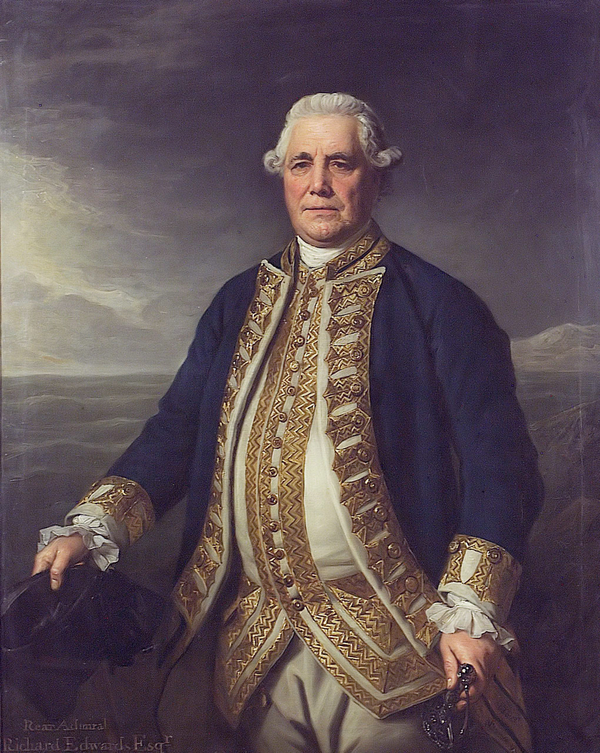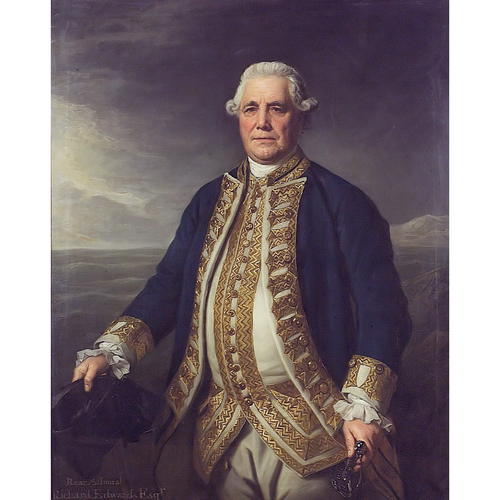
Source: Courtesy of Wikimedia Commons
EDWARDS, RICHARD, naval officer and governor of Newfoundland; b. c. 1715; d. 3 Feb. 1795 at Fordwich, Kent, England.
Richard Edwards has often been confused with his namesake, who was also a naval officer and governor of Newfoundland. Promoted lieutenant in the Royal Navy by 1740, by 1753 Edwards had risen to the rank of captain, in command of the Assistance. Four years later, during the Seven Years’ War, he was appointed governor of Newfoundland, succeeding Richard Dorrill*. During Edwards’ term of office the ships under his command were active in capturing French vessels, and these prizes provided an important source of revenue to both naval personnel and local officials. Militia units were also formed – or more probably resurrected – for defence against a possible French attack. The protection of the island also required Edwards to keep a careful watch on the increasing number of poor Irish, whose loyalty was thought to be doubtful. Although Edwards shared Dorrill’s adverse opinion of these unfortunate people, he did not carry out Dorrill’s order to have all transients returned to England at the end of each fishing season.
Edwards was succeeded as governor in 1760 by James Webb*. In 1778, commanding the Sandwich, he was present at the battle of Ushant as part of Admiral Augustus Keppel’s fleet. The following year he was made rear-admiral of the blue and was again appointed governor of Newfoundland, replacing Vice-Admiral John Montagu. Edwards’ major problem during his second term was once more the defence of the island. American privateers were numerous off the coasts [see Jeremiah Coghlan], although many were captured by Edwards’ squadron. To provide for the island’s protection, by May 1780 Edwards had recruited through the efforts of the chief engineer, Robert Pringle, about 400 men to form the Newfoundland Volunteers. This corps disbanded because the home government declined to support all the terms of its engagement, and in September Edwards authorized the raising of the Newfoundland Regiment, a provincial infantry unit. He also had batteries built or repaired in several places adjacent to St John’s that were vulnerable to attack from the sea. Because of the disruption of trade with New England and the West Indies, his activities concerning defence were complemented by earnest attempts to provision the island to meet the needs of the permanent population and the large yearly influx of transients.
In civil matters Edwards experienced difficulty with the problem of legal jurisdiction. Although empowered to hear only appeals in civil cases, by 1780 Edwards and his deputies were in practice presiding over both civil and criminal cases. The exigencies of Newfoundland’s unusual status, without clear assignment of legal jurisdiction, were largely responsible for this situation, which continued as long as all concerned accepted the judgements. The inevitable happened in 1780 when a group of Exeter merchants refused to agree to a decision and sued the governor. The case was eventually settled by arbitration, but it exposed the inadequacies of the island’s civil administration. The system nevertheless persisted long after Edwards had left Newfoundland.
In April 1782, as a consequence of Lord North’s resignation, Edwards relinquished his governorship and was succeeded by John Campbell. He was promoted vice-admiral of the white in February 1787 and the following year was appointed commander-in-chief at the Medway and at the Nore. The remaining item of note in his career was his promotion to admiral of the blue in 1794.
Metropolitan Toronto Library, Richard Edwards letterbooks, 1779–81. Charnock, Biographia navalis, VI, 105. A. H. McLintock, The establishment of constitutional government in Newfoundland, 1783–1832: a study of retarded colonisation (London and New York, [1941]), 59–62. G. W. L. Nicholson, The fighting Newfoundlander; a history of the Royal Newfôundland Regiment (St John’s, [1964?]). Paul O’Neill, The story of St. John’s, Newfoundland (2v., Erin, Ont., 1975–76), I: The oldest city, 95–96, 137–38. Charles Pedley, The history of Newfoundland from the earliest times to the year 1860 (London, 1863), 130, 136. Prowse, History of Nfid. (1895), 349–51.
Cite This Article
Frederic F. Thompson, “EDWARDS, RICHARD,” in Dictionary of Canadian Biography, vol. 4, University of Toronto/Université Laval, 2003–, accessed December 20, 2025, https://www.biographi.ca/en/bio/edwards_richard_4E.html.
The citation above shows the format for footnotes and endnotes according to the Chicago manual of style (16th edition). Information to be used in other citation formats:
| Permalink: | https://www.biographi.ca/en/bio/edwards_richard_4E.html |
| Author of Article: | Frederic F. Thompson |
| Title of Article: | EDWARDS, RICHARD |
| Publication Name: | Dictionary of Canadian Biography, vol. 4 |
| Publisher: | University of Toronto/Université Laval |
| Year of publication: | 1979 |
| Year of revision: | 1979 |
| Access Date: | December 20, 2025 |



